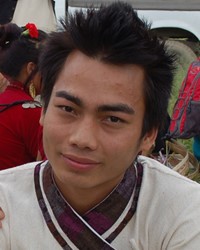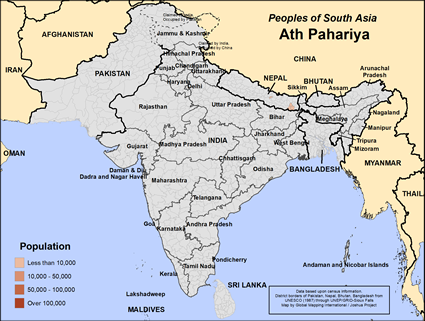Ath Pahariya in Nepal

Photo Source:
Copyrighted © 2026
International Mission Board-SBC All rights reserved. Used with permission |

Map Source:
People Group data: Omid. Map geography: UNESCO / GMI. Map Design: Joshua Project.
|
| People Name: | Ath Pahariya |
| Country: | Nepal |
| 10/40 Window: | Yes |
| Population: | 6,200 |
| World Population: | 6,200 |
| Primary Language: | Athpariya |
| Primary Religion: | Hinduism |
| Christian Adherents: | 0.00 % |
| Evangelicals: | 0.00 % |
| Scripture: | New Testament |
| Ministry Resources: | Yes |
| Jesus Film: | Yes |
| Audio Recordings: | No |
| People Cluster: | South Asia Hindu - other |
| Affinity Bloc: | South Asian Peoples |
| Progress Level: |
|
Introduction / History
Nepal, a small nation at the foot of the Himalayas, between India and Tibet, is home to approximately 270 ethnic groups, each typically speaking more than one language or dialect. Their religious beliefs are often similar, yet with unique contours.
The Ath Pahariya are part of a cluster of people known as the Rais, the largest group in eastern Nepal. The diverse groups in the cluster all speak various dialects from which most of these groups take their names. The Ath Pahariya believe they are descendants of the goddesses Marema, Mahadeva, and Nina (daughter of the earth).
What Are Their Lives Like?
Many people in Nepal are dependent upon agriculture for their livelihood, and that includes the Ath Pahariya. Most are subsistence rice farmers, but the men have a tradition of migrating to the cities for work. The Ath Pahariya have historically been limited by insufficient knowledge of modern farming technology, causing a poor yield in crops. They grow rice in the low-lying areas and potatoes, maize, wheat and barley at higher altitudes. A beverage made from barley and potatoes is used in all festive occasions.
It is typically the men's job to plow the fields, while the women plant the seeds. Families often unite to help each other at harvest time. Farmers trade any surplus crops they may have for needed items such as kerosene and salt. Others supplement their often meager incomes through craftwork and tailoring.
Like other Rai groups, the Ath Pahariya live in one or two-storied wooden or stone houses with thatched roofs. The houses usually have a wooden porch.
Collectively, the Rai are known as courageous, daring and fearless people. They have won a worldwide reputation for their bravery as "Gurkhas" in the Royal Nepalese Army. This means that they are considered to be among the finest soldiers in the world. Joining the army brings respect and a way out of economic hardship.
Marriages are facilitated by kongpi, or middlemen, who are used by the families to work out the details of the marriage. Gifts are presented and if accepted, a marriage date will be set. Formerly, some marriages were expedited by the arranged kidnapping of the girl of one's choice. Marriages are very festive occasions and everyone enjoys an abundance of meat and drinks. Gifts are given to the parents of the bride and groom as well as to a long line of family members and village elders. Often the whole night is spent singing and celebrating.
What Are Their Beliefs?
Hinduism and Buddhism exist side by side and are somewhat intermingled in the hearts of the Ath Pahariya people. They are officially Hindus but many are Buddhists or nature worshippers. They have a wide variety of deities and worship forms. Their religious customs are most evident at celebrations of birth, marriage and death. While they worship the various Hindu gods, they also follow a Buddhist way of life and obey the teachings of the Lamas. At the same time, they have faith in many local spirits and supernatural forces. The influence of Hinduism has led to many of the dead now being cremated instead of being buried.
What Are Their Needs?
The Ath Pahariya people need to hear the gospel of Jesus Christ. They need for Christians to come to them, reach them with the good news, display Christian love to them, and call them to repent of holding to false religions.
Prayer Points
Pray for the Lord to send laborers who would share the gospel with the Ath Pahariya people.
Pray for the Lord to draw people to Himself, and that new believers would make disciples of those around them.
Pray new believers would not additionally hold to elements of other religions.
Pray the Ath Pahariya people would repent and trust in Christ as Savior and Lord.